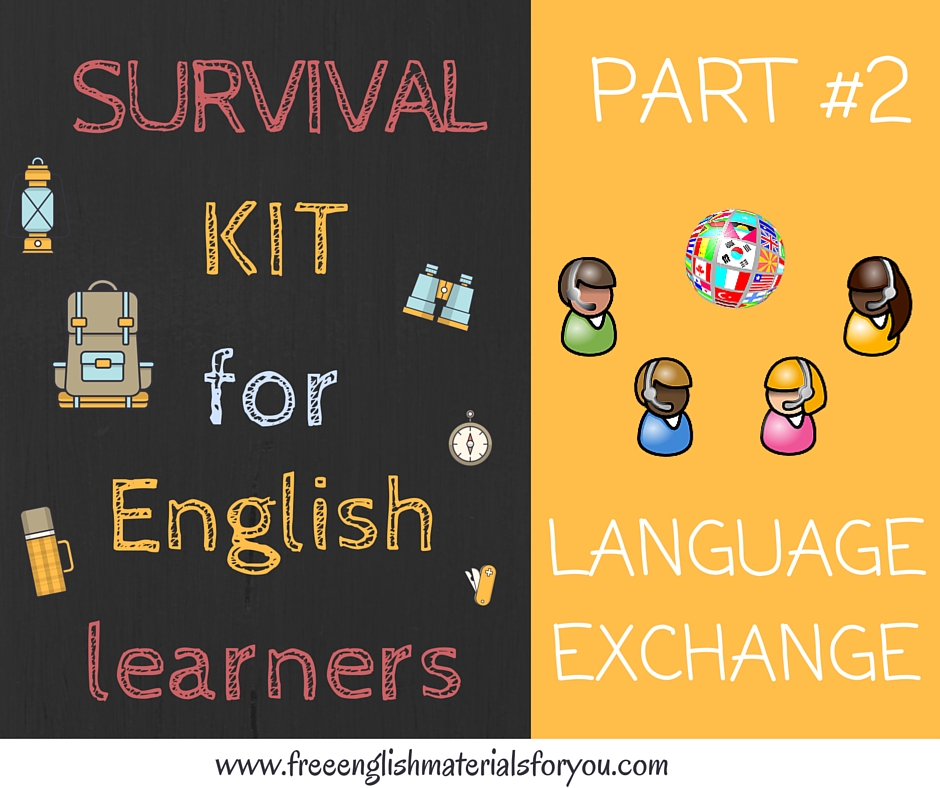
Tag: Learning English
A face like thunder – IDIOM

More example sentences from the web:
- And then sat there with a face like thunder for the rest of the afternoon.
- He had a face like thunder when he found out about their affair.
- Mark left here at dawn, with a face like thunder.
COME DOWN WITH SOMETHING

Example sentences from the web:
- Maybe you’re coming down with an ear infection…
- He came down with malaria, went home, recovered, and in early 1996, with the support of the World Health Organization, returned.
- Mr C. has come down with a fever. He can’t work today.
Get along

More example sentences:
- I don’t get along with Sebastian, we have nothing in common!
- The reason you don’t get along is because you have different values.
- I like her so much! We are getting along well.
Another meaning of ‘TO GET ALONG’ is ‘to manage’, ‘to cope’, ‘to make progress while doing something’.
Example sentences:
- I’m not getting along well with my schoolwork. I need to work harder.
- How are you getting along with your work?
- I just can’t get along without a secretary.
SYNONYMS:
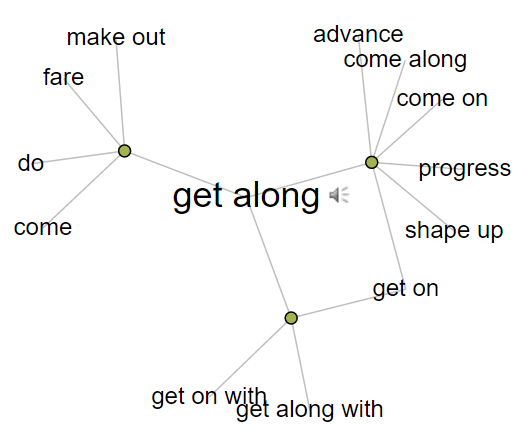
8 Practical ways to help refugees – Reading comprehension
An interesting article on how to help refugees by Melissa Fleming and published on IDEAS.TED.COM . Are you doing something in order to help refugees? If you have other ideas, share them in the comments below.
I’m teaching them Italian
https://www.facebook.com/113824145324888/photos/pcb.1337847106255913/1337846886255935/?type=3&theater
and I hope I’ll be able to help them in this way. I find it both rewarding and informative. It’s fascinating getting to know them and their stories, helping them integrating with locals.
Here a vocabulary list for making it easier for you to read the article 8 practical ways to help refugees:
- To show up: to arrive where you have arranged to meet somebody or do something.
- To take notice: to give attention to something.
- Steadily: happening or developing in a continuous and usually gradual way.
- Drifted: moved slowly, especially as a result of outside forces, with no control over direction.
- Stranded: left in a place without a way of leaving.
- To thrive: to flourish; to become, and continue to be, successful, strong, healthy, etc.
- To exacerbate: to make something worse.
- Shunned: to ignore someone and not speak to that person because you cannot accept their behaviour, beliefs, etc.
- To exploit: to treat a person or situation as an opportunity to gain an advantage for yourself.
- Outpouring: an expression of strong feeling that is difficult to control.
- To enrol: to arrange for yourself or for somebody else to officially join a course, school, etc.
- Raffle: an activity in which people buy tickets with different numbers, some of which are later chosen to win prizes, that is organised in order to make money for a good social purpose.
Read the article, then try to answer the questions below it:
Melissa Fleming of the UN’s Refugee Agency shares some ways to help refugees right now.
When a million refugees showed up in Europe this past year, the world began to take notice of a problem that has been steadily growing before our eyes. Ten years ago, 38 million people had been driven from their homes because of war or persecution; right now that number stands at over 65 million. That’s equivalent to the population of France … drifting, stranded, with little hope of returning home, and few chances to thrive in neighboring countries.
In Europe, the lack of a unified system to manage the influx of refugees and migrants is exacerbating the problem. People are either welcomed or shunned. They can face fences of barbed wire or cheer locals. Around 50,000 people are stranded in Greece, waiting to be relocated to other European countries or sent back home.
On the streets of European cities, I have seen both remarkable generosity and irrational fear. People carry signs with the slogan “Refugees Welcome”; others set asylum homes on fire. While many push for values of tolerance and openness, others are full of fear, afraid of the arrival of so many people from a different continent, with different religions and cultures. Opportunistic right-wing politicians exploit these fears to make gains in elections.
People often ask me what they can do to help. It’s certainly possible to do small, practical but meaningful things to combat the feeling of helplessness that can all too easily become paralyzing. Already, I’ve been struck by the overwhelming outpouring of meaningful acts of kindness by individuals, local charities, religious groups and students who have made their way to borders and train stations to help arriving refugees and migrants (check out the inspiring work done by a team on Lesbos to coordinate efforts to greet the 5,000 refugees arriving on the Greek island every day). Their message is clear: they stand for a Europe that offers refuge to victims of war and compassion for those who are seeking a better life.
Click here to keep reading the article: http://ideas.ted.com/8-practical-ways-to-help-refugees/
Answer the following questions:
- A decade ago, 38 million people had been forced to leave their homes, for what reasons?
- Is Europe having issues in managing refugees and migrants?
- Why are some people scared of refugees?
- What are the 8 possible ways to help refugees suggested by Melissa Fleming?
- Where did the refugees Welcome Initiative start?
- How many entrepreneurs started a catering company with refugees chef in France?
- Someone started a football team for refugees and migrants, in what country?
- What did the What Design Can Do Refugee Challenge do?
- What’s doing the organisation United Invitations?
- What Universities offered funds and scholarships to refugees worldwide?
- Do you have other ideas for helping refugees?
Get rid of

‘Get rid of’ is an INSEPARABLE phrasal verb.
Example sentences:
- She’s trying to get rid of us.
- I can’t get rid of my phone until John calls.
- I just can’t bring myself to get rid of this old dress because it has so many good memories attached to it.
Listening activity: “Michigan Resident Helps Syrian Refugees Settle In” – AJ+ video
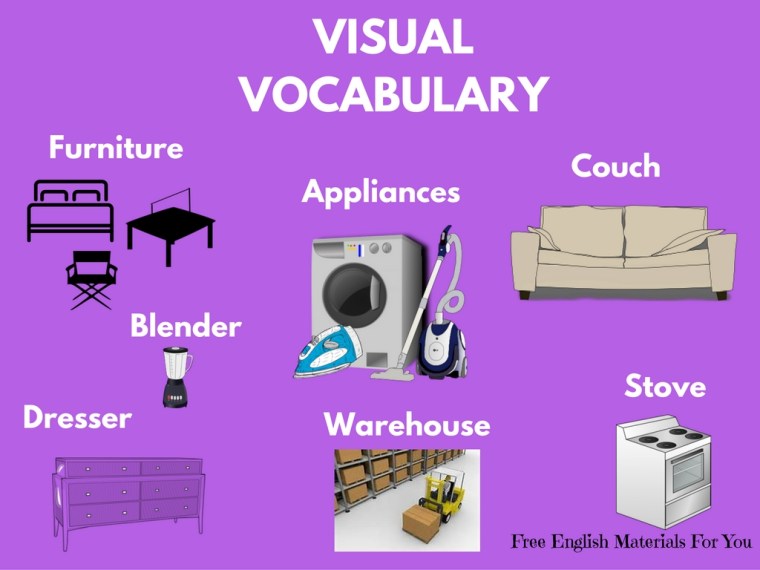
Other words you may not know:
- Item: an individual thing.
Ex. An item of clothing.
An item of furniture. - To resettle: to begin to live in a new area after leaving an old one; to settle again.
Ex. The only way to resettle a Mexican family here is by granting them political asylum.
Watch the video, then try to fill in the gaps in the following sentences:
- We give them as much ______________ as we can that they need, depending on how many people are in the house.
- We give them ______________, and stoves if they are needed.
- We’d been able to work with these _________________.
- They come ___________ to our houses, meet our parents, meet our kids.
- They feel that they have a sense of family _____________ because most of these families have been _________________.
Downloadable PDF file: Michigan Resident Helps Syrian Refugees Settle In – Listening Activity
Downloadable PDF file: Michigan Resident Helps Syrian Refugees Settle In – Listening Activity – answers
Nuclear Energy Explained – How does it work? – Listening activity
Video made by In a Nutshell, a Munich-based YouTube channel, and design studio.
In my opinion, this is a very informative channel, great for English students and teachers. This is why I suggest that you check it out: In a Nutshell.
The video I picked for today’s lesson is about nuclear energy and it’s the first of a trilogy. It won’t take you long to watch it since it lasts about 5 minutes. As always, you should read the vocabulary list before watching the video. After that, you can test your listening comprehension answering some questions.
For teachers:
Before watching the video, I suggest that you ask your students what do they know about Nuclear Energy and what do they think are the pros and cons of it. Are they against or for nuclear energy? Can they justify their answer? Ask them to write down their reasons and if you have enough time, made a mind map with all the pros and cons.
VOCABULARY
- Frustrating: making you feel annoyed or less confident because you cannot achieve what you want.
Ex. It’s frustrating when you’re not on the same page. - Get/come to grips with something: to start to deal with a problem, situation, or job that you have to do.
Ex. We need to get to grips with our different world views. - Spin-off: something useful that results from work done to produce something else.
Ex. The World Summit on the Information Society produced valuable results; it also had a spin-off, a focusing effect. - On your feet: in a good position or condition.
Ex. Experts say the economy should be back on its feet any year now. - Hangover: a letdown, as after a period of excitement.
Ex. The students hadn’t recovered from their summer break hangover yet and did terribly on their first test. - To stick with something: to continue to do or use something, and not change it.
Ex. If you’ve found something that makes you happy, you should stick with it. - To skyrocket: to increase quickly to a very high level or amount.
Ex. Housing prices have skyrocketed in recent months. - Dazzling: very attractive or exciting.
Ex. The actor has had a dazzling career. - Pace: the speed at which something happens.
Ex. Since the elections of 1998, the pace of reform has been impressive. - Underdog: in a competition, the person or team considered to be the weakest and the least likely to win.
Ex. It was a surprise to everyone when the underdog won the match. - Nuclear fission: a process in which the nucleus of a heavy atom is split apart.

Image source
- On the brink of: extremely close to.
Ex. Eagleton is on the brink of an epic financial disaster. - Turbine: an engine that has a part with blades that are caused to spin by pressure from water, steam, or air.
- To threaten: to be likely to harm or destroy something.
Ex. Difficulties experienced by an individual institution may affect other banks in a way which could threaten the banking system as a whole. - Drawn-out: continuing for or taking a long time.
Ex. The network doesn’t want a long, drawn-out trial.
Downloadable PDF version: VOCABULARY – Nuclear Energy Explained
After watching the video, try to answer the following questions:
1. What did private companies think about nuclear power?
2. When did nuclear power’s success finally come?
3. What were the advantages of the light water reactor?
4. What does a water reactor do?
5. Is the water reactor the safest one?
6. What happened in 1979?
7. When did the Chernobyl catastrophe take place?
8. What’s the situation today?
Downloadable PDF version (Questions): NUCLEAR ENERGY EXPLAINED – Questions
Downloadable PDF version (Answers): NUCLEAR ENERGY EXPLAINED – Answers
Frenemy – English Slang
Have you ever been betrayed by a friend? It happened to me in the past and I must say, it’s pretty awful! Unfortunately, it’s something common and there are several ways to refer to this kind of people:

Image source
Example sentences from the web:
- “What do you think about frenemies?”
“I say, keep your friends close, and your frenemies closer.” - Zack is John’s frenemy. They get a long in the office but both of them work on internal competing teams.
- Gwyneth had a frenemy once and was troubled at the joy she felt when thisperson suffered a terrible public humiliation.
“Frenemy” on the Web: How to Deal With Frenemies
P.S.: I’m sure you got it, but if you didn’t … This term is a combination of the words “friend” and “enemy” ;-).
Survival Kit for English Learners PART #2
This is the 2nd part of the “Survival Kit” for English Language Learners. Many students want to practice English, but it’s difficult for them to find someone willing to talk with them in English. There are several websites online where you can look for English speakers willing to talk with you and learn your language while helping you improving your English skills. Furthermore, there are WhatsApp groups. I will try to narrow them down to 5.
1. PALTALK

You have to download it, but you don’t have to pay anything.
Once opened, it looks like this:
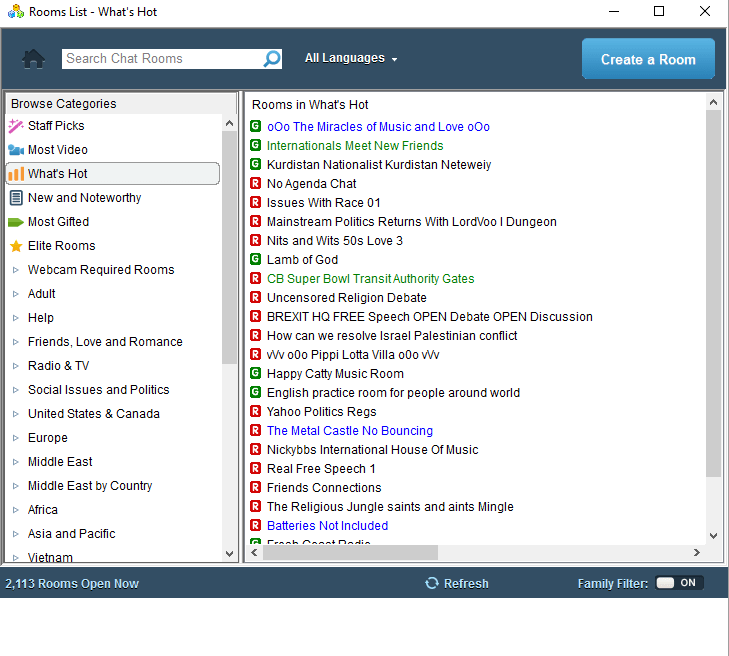
As you can see, you can either create a new room or join one. For instance, by clicking “What’s hot” I’ve found a chat room called “English practice room for people around the world”, probably a useful one ;-). Paltalk is very easy to use.
What else … It’s possible to video chat, but it’s not mandatory. If you’re shy or you’re not up to a video chat, just turn off the webcam.
Link: http://www.paltalk.com/
2. ITALKI: Learn a Language Online

Watch this video and see how it works:
On Italki you can find Native English Speakers willing to learn your language (the Language Exchange feature is free).
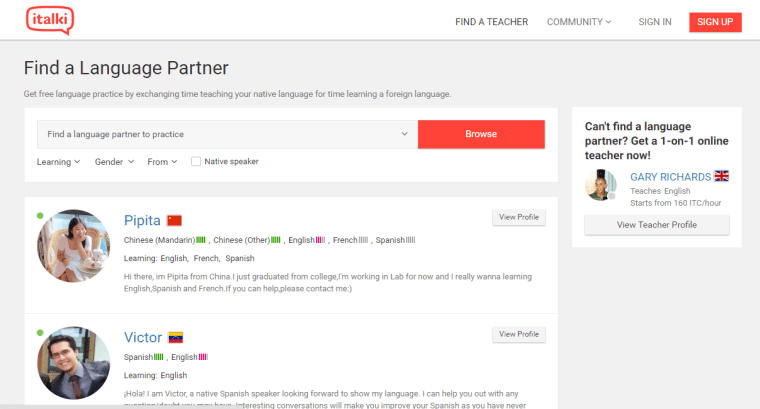
On Italki, you can also read interesting articles, discuss with other people interesting topics, and with Notebook you can improve your writing skills:
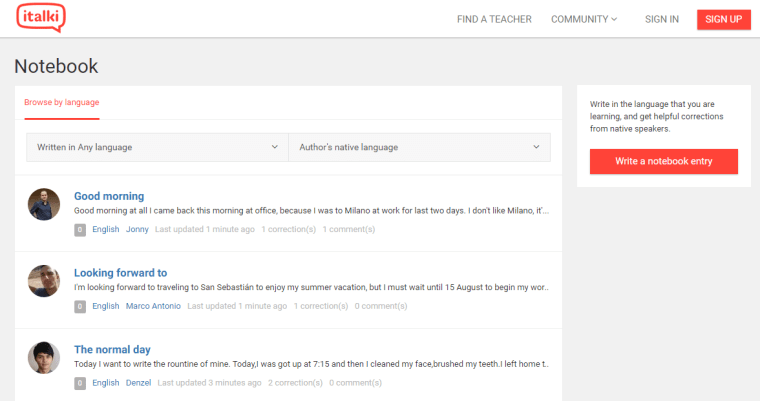
Link: https://www.italki.com/
3. MY LANGUAGE EXCHANGE

For example, I’ve looked for native English speakers who want to learn Italian. As you can see, there are more than 60000 people willing to speak English with me while learning Italian:
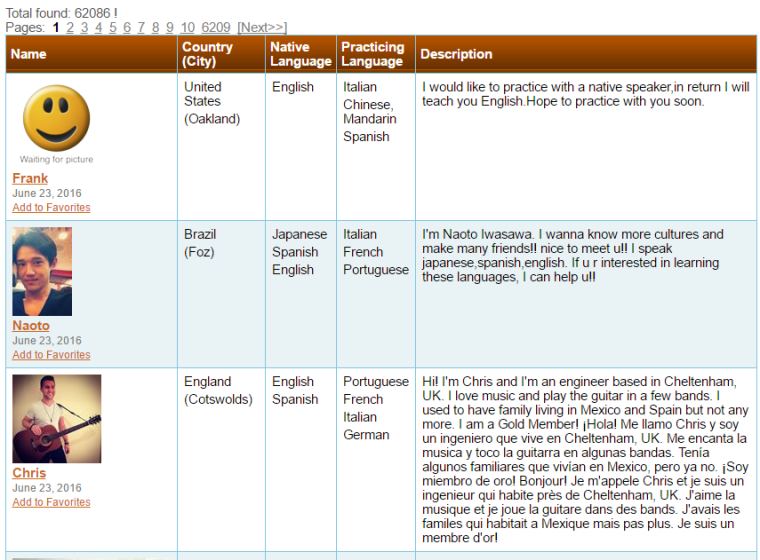
Link: https://www.mylanguageexchange.com/
4. MY ENGLISH TEACHER
On this website, you can find people to practice English with (on Skype or on WhatsApp), useful tips and resources.
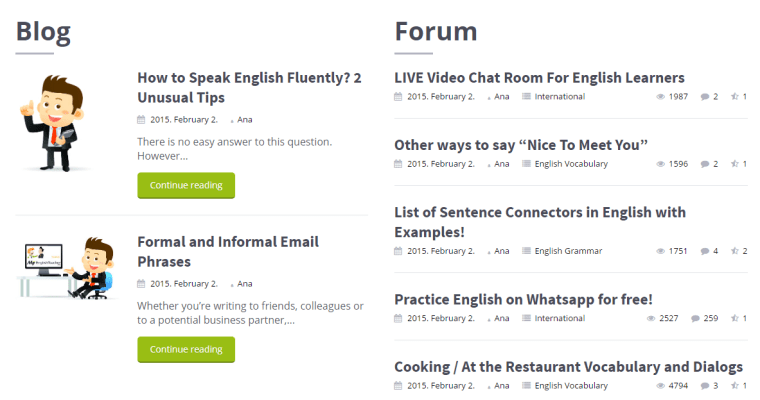

Link for WhatsApp: http://www.myenglishteacher.eu/question/does-anybody-want-to-practice-english-on-whatsapp/
Link for Skype: http://www.myenglishteacher.eu/question/practice-english-on-skype-for-free/
5. BUSUU
This is probably one of the most famous Language Exchange Websites, not all the features are for free, but you can get corrections from native speakers, writing exercises, and flashcards for free.

Link: https://www.busuu.com/



